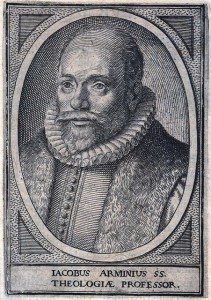Introduction
Many theologians and pastors in our time claim that John Calvin would not be a Calvinist himself if he were alive today. I think in some aspects this assertion is true. Calvin’s own writings don’t read quite as clear on a couple of points that Calvinists of today are staunch about. It does appear, at least on the surface, that on some issues he’ll state one thing and in another he’ll say something that seems to contradict it. However, this is not necessarily a bad thing, especially when you take into account the incredible volume of writings and preaching he accomplished. Not to mention we all grow, learn, and change our ideas on things (including theology).
The main reason many claim that John Calvin wasn’t a Calvinist, as defined in our day, is because he himself is not responsible for developing the codified system of theology which is known by his name. He wasn’t even alive when the famous acronym defining the Doctrines of Grace was formulated.
I don’t completely agree with the above paragraphs, as I find it to be true all of the elements of the acronym (T.U.L.I.P.) can be found in the resources Calvin has left behind. However, I don’t completely disagree with everything stated above either.

Jacobus Arminius
Several years after Calvin died in 1564, Jacobus Arminius went to Geneva in order to study under Theodore Beza, the man who took over as Calvin’s successor.
Arminius finished his studies in 1587 and then moved to Amsterdam where he served as the pastor of a church. During a preaching series through the book of Romans, he started to disagree on several theological issues that were held by Calvin. Interestingly, it was while attempting to defend the teachings of Calvin against critics that brought Arminius to the point of doubting some of the conclusions Calvin had taught. In a similar, but far less dramatic way, just as Luther and Calvin had boldly attempted to bring reform to the Roman Catholic Church, Arminius tried to bring some type of reform to Lutheranism and Calvinism.
The Remonstrance
After Arminius died in 1609, some of his followers put together a document which was titled, “The Five Articles of Remonstrance.” Martin Luther originally posted his 95 Theses on the church door in Wittenberg on October 31 of 1517, in order to make his objections known to the Roman Catholic Church so the leaders could get together and discuss his objections. In a like manner, the intent of the Five Articles of Remonstrance was an invitation by those who followed the teachings of Arminius to those who followed the teachings of Calvin so they could get together in order to discuss their differences.
The Five Articles
The result of all this was condemnation of Arminius and the Remonstrants, but the controversy did not stop and it had a liberalizing effect on theology in Europe and England, as well as the American colonies. Somewhere around the mid-1700s the basic positions of Arminius were cleaned up a bit and expanded in England by the renowned brothers, John and Charles Wesley. In both England and the early United States, Methodism and a stream of other churches followed what came to be known as Arminian-Wesleyan theology. Even in our time, the five points of the Remonstrants still provide an accurate summary of the differences between Calvinistic/Reformed traditions and Arminian Wesleyan traditions.
The Big Five
- Conditional Election – That God, by an eternal and unchangeable purpose in Jesus Christ his Son before the foundation of the world, has determined that out of the fallen, sinful race of men, to save in Christ, for Christ’s sake, and through Christ, those who through the grace of the Holy Spirit shall believe on this his son Jesus, and shall persevere in this faith and obedience of faith, through this grace, even to the end…
- Unlimited Atonement – That, accordingly, Jesus Christ the Savior of the world, died for all men and for every man, so that he has obtained for them all, by his death on the cross, redemption and the forgiveness of sins; yet that no one actually enjoys this forgiveness of sins except the believer, according to the word of the Gospel of John 3:16 and 1 John 3:2…
- Deprivation – That man does not possess saving grace of himself, nor of the energy of his free will, inasmuch as in his state of apostasy and sin he can of and by himself neither think, will, nor do anything that is truly good (such as saving Faith eminently is); but that it is necessary that he be born again of God in Christ, through his Holy Spirit, and renewed in understanding, inclination, and will, and all his faculties, in order that he may rightly understand, think, will, and effect what is truly good, according to the Word of Christ…
- Resistible Grace – That this grace of God is the beginning, continuance, and accomplishment of all good, even to the extent that the regenerate man himself, without prevenient or assisting, awakening, following and cooperative grace, can neither think, will, nor do good, nor withstand any temptations to evil; so that all good deeds or movements that can be conceived must be ascribed to the grace of God in Christ. But with respect to the mode of the operation of this grace, it is not irresistible, since it is written concerning many, that they have resisted the Holy Spirit (Acts 7, and elsewhere in many places).
- Assurance and Security – That those who are incorporated into Christ by true faith, and have thereby become partakers of his life-giving Spirit, as a result have full power to strive against Satan, sin, the world, and their own flesh, and to win the victory; it being well understood that it is ever through the assisting grace of the Holy Spirit; and that Jesus Christ assists them through his Spirit in all temptations, extends to them his hand, and if only they are ready for the conflict, desire his help, and are not inactive, keeps them from falling, so that they, by no deceit or power of Satan, can be misled nor plucked out of Christ’s hands, according to the Word of Christ, John 10:28: “Neither shall any man pluck them out of my hand.” But whether they are capable, through negligence, of forsaking again the first beginning of their life in Christ, of again returning to this present evil world, of turning away from the holy doctrine which was delivered them, of losing a good conscience, of neglecting grace, that must be more particularly determined out of the Holy Scripture, before we ourselves can teach it with the full confidence of our mind.*
Doctrines of Grace (TULIP – Calvinism)
Those who followed the teachings of John Calvin met in Dordrecht, Netherlands sometime during 1618 to 1619 and developed a statement of their own which has become known as the Canons of Dort. This consisted of a point-by-point refutation and condemnation of the Five Articles of Remonstrance. Accordingly, there were five main points to this countering document. These five main points found in the Canons of Dort are what has come to be known as “Calvinism” and/or “The Doctrines of Grace.”
These five doctrinal statements are most commonly referred to and summarized today by the simple acrostic, TULIP:
- Total Depravity – Mankind is completely sinful and cannot do a single thing to contribute to his salvation. Until one’s heart is regenerated by God they cannot “choose” Christ.
- Unconditional Election – Because of the above, we are completely dependent on God to initiate salvation for us, which He did in eternity past by choosing (or electing) to save some, without any condition, work, or effort on their part.
- Limited Atonement – In order to accomplish the salvation of those God has previously chosen, God sent Jesus, His Son, to die specifically for the sins of those whom He has elected so that they can receive eternal life.
- Irresistible Grace – Those whom God has predestined for salvation, for whom Christ died, will be irresistibly drawn by God’s grace into the family of God as His children.
- Perseverance of the Saints – Since God’s will cannot be changed or influenced, not a single one whom God has chosen, for whom Christ died, and whom were drawn and transformed by God’s irresistible pull of grace, can ultimately be lost (lose their salvation). All of them will be glorified. Due to this direct gift of grace from God in their life, all those who are delivered by God’s grace in this way will show evidence to it by living a life of perseverance in faith and obedience to the Word.
The Sovereignty of God
Another aspect of Calvinism that must be mentioned is God’s Sovereignty. Clearly it’s not listed as one of the specific points of Calvinism’s TULIP, but it is the foundation of which they all stand. The belief of God’s complete and absolute control over all things can be seen behind every single one of the five points from first to last, if humans are to have any hope of salvation, and if God is to be certain of defeating sin, death, and the devil in the ultimate end.
Conclusion
Well, that about sums it up as briefly as possible while still mentioning all that needs to be said. Of course there are different levels and nuances to each position. Some even claim to believe three or four points of one and one or two points of the other. I’m not sure if one follows the logic of each system, particularly Calvinism, if that’s possible. But, as the old cliché states, we need to be careful that we are not putting God in a box.
* “The Articles of the Remonstrants” are adapted from Phillip Schaff, The Creeds of Christendom, Volume 3, Baker Books, Grand Rapids, 1996, pp 545ff.
Featured Image Credit: “Juan Calvino” by Fondo Antiguo de la Universidad de Sevilla; CC BY 2.0
This was a guest post from Dr. Jeff Hagan.
Jeff is an ordained Christian minister with over 23 years of ministry experience. He has attended Gordon-Conwell Theological Seminary, Luther Rice Seminary, Tyndale Seminary and a handful of other institutes as well. He has earned several degrees including the Doctor of Christian Education and the Doctor of Theology.













